Tech tools come and go so fast that I hesitate to write about a
specific app in regards to volunteer support and engagement - by
the time I've invested the time and research into how it's being
used, and learned to use it myself, the tool is already being
replaced by something much more popular and very different. An
added challenge is that what's popular in the USA might not be
in, say, India, and vice versa, and I don't want to write just
for USA audiences - but I don't always have the time to invest
in learning about tools popular elsewhere, especially when I
don't know if the app has staying power or is just a fad.
People in many countries often rely on only one or two text messaging services to stay in direct touch with family and friends - they don't try to use them all. As of 2019, the lay of the land looked like this: in China, WeChat, which is made by Tencent, is popular, while WhatsApp is heavily used in South America, India and "the stans." A lot of people in Eastern Europe prefer Telegram to WhatsApp because it isn't owned by Facebook. People in the USA are much more divided in their use of direct messaging - no one tool dominates the landscape.
This article in ICT Works notes:
With more than two billion users in over 180 countries, WhatsApp is an ideal means of staying in touch with others. The app, which first started as an alternative to SMS, is free and offers simple, secure, and reliable messaging and calling. HIV program implementers can use WhatsApp for virtual collaboration and to provide technical assistance to remote-based partners, staff, and clinicians.
WhatsApp is both the direct messaging and the social media tool of choice in many countries and, even though it hasn't really caught on in the USA, it's worth talking about, for three reasons:
These are all features many young people really love. I find the phone number integration annoying, but I am old, so there you go. By contrast, Facebook and Facebook Messenger ask users to provide their names. Matching Facebook and Instagram users to their WhatsApp handles should give pause to those who are hoping to keep their use of each app separate.
WhatsApp is owned by Facebook, and Facebook already allows a user to connect it into their Facebook page (navigate to your Facebook business page, click settings, in the left side column, click WhatsApp, choose your country code, enter your WhatsApp number and click send code - and, voila), though the stated plans are that users can keep Facebook, Instagram and WhatsApp each as stand-alone apps, making it possible for WhatsApp, Messenger and Instagram users to send messages to one another across platforms but without switching apps.
Facebook is launching a new function called Facebook rooms and, as of July 2020, there is some rumors that these rooms will be integrated with WhatsApp.
The point of my bringing all of this up is twofold:
I don't use What's App in my work with volunteers,
but I do use it with clients and colleagues and friends outside
the USA; it's an easy way for them to text me and to have short
video chats. And it's FREE.
But I'm seeing Whats App regularly referenced as a
way to work with volunteers:
Here are examples I found in June 2020 of NGOs using WhatsApp as a part of their volunteer recruitment, support and engagement. Here are some examples I found in June 2020 on social media with just some keyword searches on Twitter:
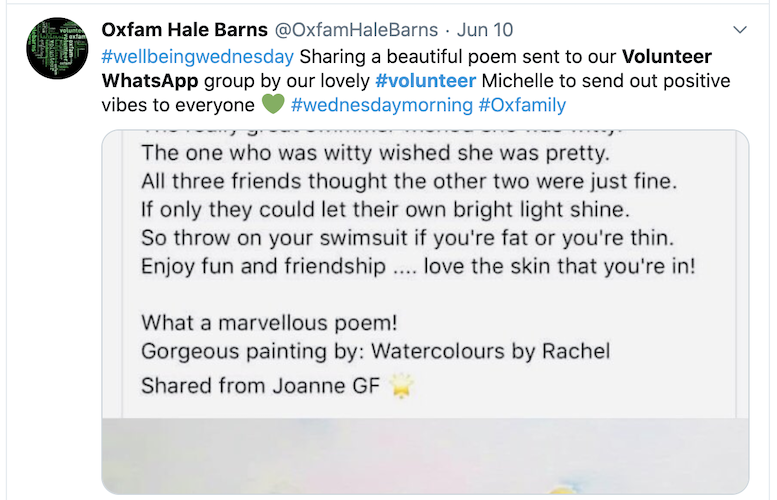

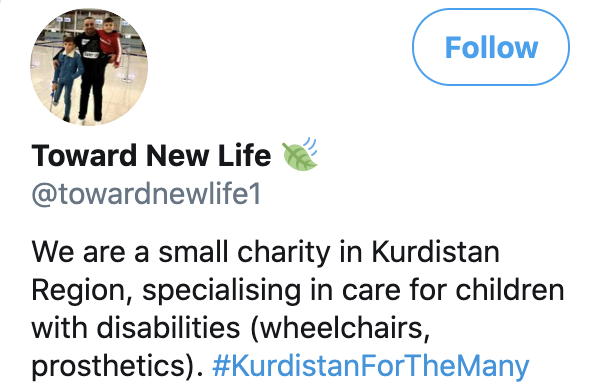

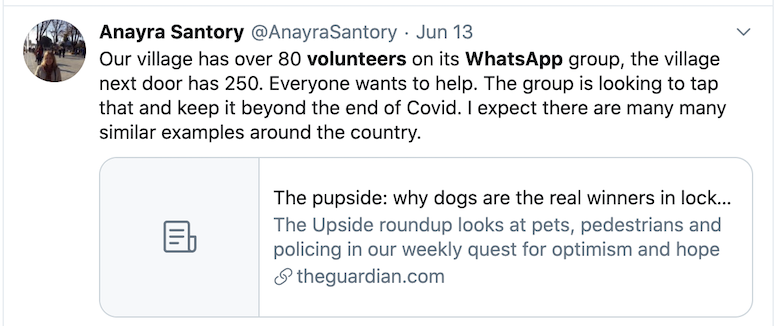
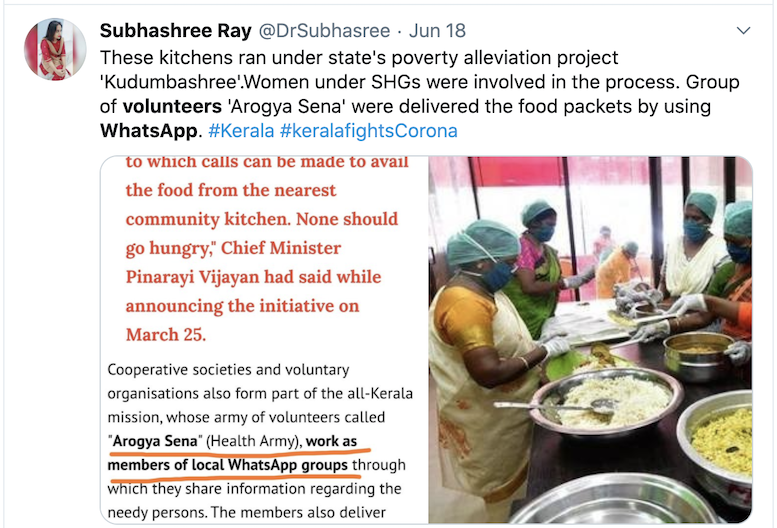
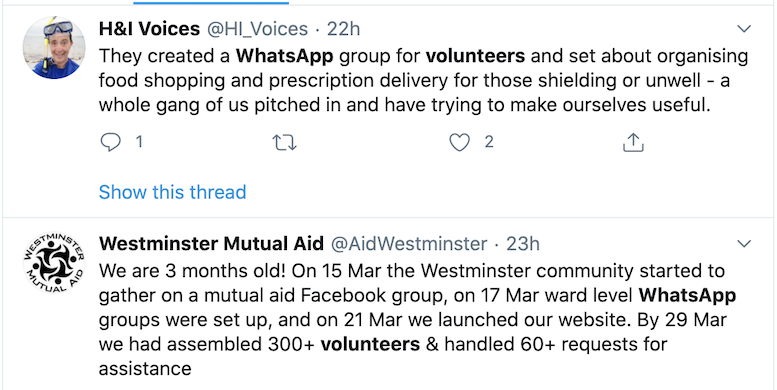

While not a volunteer-specific example, the aforementioned ICT article offers an overview of how HIV Programs Can Use to Mitigate COVID-19 Impact and notes that:
In Jakarta, Indonesia, the lockdown limited the ability of LINKAGES staff to continue hosting physical meetings and trainings with health providers. They switched to using WhatsApp for weekly discussions. With more than 200 participants, these sessions have helped roll out facility-level responses to COVID-19, including multimonth dispensing of ART, which allows people living with HIV to visit health facilities less frequently.
As of July 2020, yes, I do think you should add What's App to your smart phone and experiment with it.
You are going to know in two or three months if the your network of colleagues, including volunteers, or friends are using this tool, and if they find it helpful. And it will take a bit longer for you to find out if this is a tool you want to use with your volunteers. But make no mistake: this is the style of social media in the future, and you, a person that works with volunteers or young people as a part of your work at a nonprofit, NGO or charity, need to learn how it works.
 my home page
my home page my consulting services
& my workshops &
presentations
my consulting services
& my workshops &
presentations my credentials & expertise
my credentials & expertise Affirmation that this web site is
created & managed by a human.
Affirmation that this web site is
created & managed by a human. My book: The Last Virtual Volunteering
Guidebook
My book: The Last Virtual Volunteering
Guidebook contact me or see my schedule
contact me or see my schedule Free Resources: Community Outreach, With & Without
Tech
Free Resources: Community Outreach, With & Without
Tech Free Resources: Technology Tips for Non-Techies
Free Resources: Technology Tips for Non-Techies Free Resources: Nonprofit, NGO & other
mission-based management resources
Free Resources: Nonprofit, NGO & other
mission-based management resources Free Resources: Web Development, Maintenance,
Marketing for non-Web designers
Free Resources: Web Development, Maintenance,
Marketing for non-Web designers Free Resources: Corporate philanthropy / social
responsibility programs
Free Resources: Corporate philanthropy / social
responsibility programs Free Resources: For people & groups that want
to volunteer
Free Resources: For people & groups that want
to volunteer linking to or from my web site
linking to or from my web site The Coyote Helps Foundation
The Coyote Helps Foundation me on social media (follow
me, like me, put me in a circle, subscribe to my newsletter)
me on social media (follow
me, like me, put me in a circle, subscribe to my newsletter)To know when I have developed a new
resource related to the above subjects, found a great
resource by someone else, published
a
new blog, uploaded a new
video,
or to when & where I'm training or presenting, use any
of the following social media apps to follow me on any of
these social media platforms:
Disclaimer: No guarantee of accuracy or suitability is made by
the poster/distributor of the materials on this web site.
This material is provided as is, with no expressed or implied
warranty or liability.
See my web site's privacy policy.
Permission is granted to copy, present and/or distribute a limited amount of material from my web site without charge if the information is kept intact and without alteration, and is credited to:

Otherwise, please contact me for permission to reprint, present or distribute these materials (for instance, in a class or book or online event for which you intend to charge).
The art work and material on this site was created and is copyrighted 1996-2025